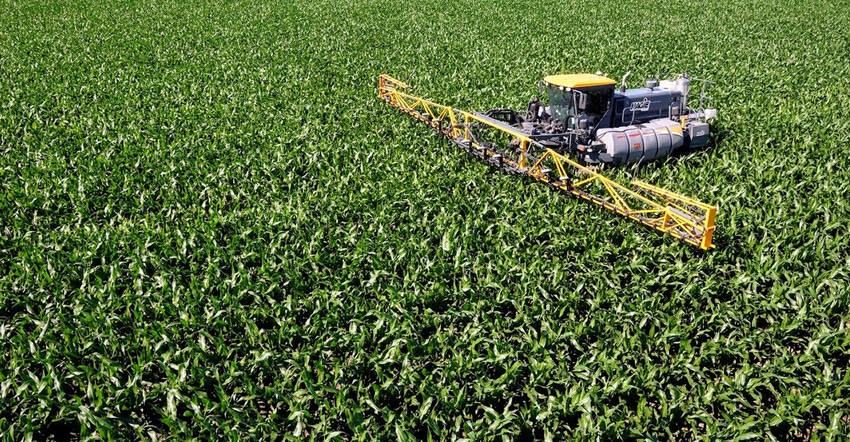February 3, 2021

Are you interested in how agriculture technologies can improve nitrogen management on your farm? Nebraska Extension’s On-Farm Research Network has launched a new Precision Nitrogen Management project. The goal is for producers to get hands-on experience with new technologies to manage nitrogen more efficiently and evaluate how these technologies will work on their operation.
This project is made possible through a $1.2 million On-Farm Conservation Innovation grant from USDA's Natural Resources Conservation Service that connects corn and wheat producers across Nebraska with access to cutting-edge technologies through on-farm research.
In the past few years, a number of on-farm studies have been completed looking at the topic of precision nitrogen management, and the Precision Nitrogen Management project team is looking for growers to participate in these studies in 2021.
Crop canopy sensing
Crop canopy sensing for nitrogen management has been explored through Project SENSE. These studies use a high-clearance applicator equipped with Ag Leader OptRx sensors. As the crop canopy is sensed, UAN fertilizer is applied with drop nozzles in real time.
Across 51 sites from 2015 to 2018, the sensor-based approach resulted in a savings of 29 pounds of nitrogen per acre compared to the grower’s traditional methods and reduced yields by only 1 to 2 bushels per acre.
This resulted in a profit increase of $8.41 per acre. If you are interested in participating in a study looking at crop canopy sensing, email Joe Luck at [email protected].
Sensor-based fertigation
Sensor-based fertigation management uses multispectral imagery captured with a drone to inform weekly fertigation decisions. Sensor-based fertigation management has been investigated through 10 on-farm research trials in recent years.
Compared to the grower’s typical management, sensor-based fertigation resulted in higher nitrogen-use efficiency 95% of the time, and greater profit 50% of the time. If you are interested in learning more or participating in future sensor-based fertigation trials, email Jackson Stansell, graduate research assistant in biological systems engineering, at [email protected].
Crop modeling studies
Crop modeling studies provide an opportunity to evaluate commercially available crop model-based tools such as Granular, Adapt-N, FluroSat, FarmersEdge N-Manager, Maize-N, and more. These tools dynamically account for interactions occurring between crop management, soil characteristics and weather, reducing the risk of nitrogen and yield losses.
In 2020, one producer evaluated Granular and Adapt-N to determine the effect of using these tools to direct in-season variable-rate nitrogen application in corn. If you are interested in conducting on-farm research to evaluate how one of these tools may work on your operation, email Laila Puntel at [email protected].
Nitrogen inhibitors
Nitrogen inhibitors have been evaluated through nine on-farm research studies in 2019 and 2020. Although we did not see consistent benefit of using nitrogen inhibitors in silt loam or silt clay loam soil, greater benefits are expected with coarser textured soils. The nitrogen inhibitors should be considered as insurance, rather than yield boosters.
Normally, there is some potential for one or more nitrogen loss mechanisms to influence fertilizer availability, resulting in some yield protection from the use of these nitrogen inhibitors. Enhanced soil sampling is planned for the upcoming studies to provide more information about how these products will work in various weather and soil conditions.
If you are interested in evaluating a nitrification inhibitor on your operation, email Javed Iqbal at [email protected].
Growers and consultants who choose to participate in one of the Precision Nitrogen Management projects will work closely with Nebraska Extension to evaluate the agronomic and economic impacts of using the technology.
Eligible producers who complete these studies will receive $1,300 for recognition of their time and resource commitments and to mitigate risk of potential yield and profit loss. Cooperating producers also will be eligible to receive up to $1,200 for eligible technology costs associated with these studies.
Interested growers can find additional information regarding the project at go.unl.edu/precisionnitrogen or contact Laura Thompson, Extension educator and director, Nebraska On-Farm Research Network, at [email protected] or 402-245-2224.
If you are interested in seeing more in-depth results of these and other on-farm research projects conducted in Nebraska, make plans to attend the 2021 Nebraska On-Farm Research Meetings on Feb. 25 or 26. In-person and online options are available. More information and registration is available at go.unl.edu/2021OnFarmResearch.
Thompson is a Nebraska Extension educator and director of the On-Farm Research Network.
You May Also Like




